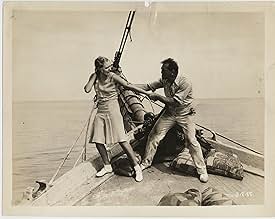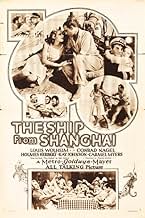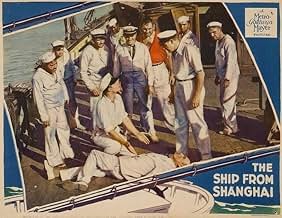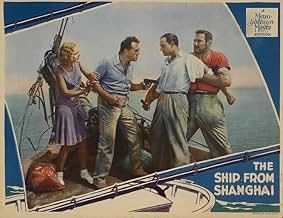Ajouter une intrigue dans votre langueOn a yacht sailing from Shanghai to the United States, the sailors, led by the megalomaniac steward, revolt and take control.On a yacht sailing from Shanghai to the United States, the sailors, led by the megalomaniac steward, revolt and take control.On a yacht sailing from Shanghai to the United States, the sailors, led by the megalomaniac steward, revolt and take control.
- Réalisation
- Scénario
- Casting principal
Henry Armetta
- Sailor
- (non crédité)
Willie Fung
- Shanghai Nightclub Patron
- (non crédité)
Pietro Gentile
- Minor Role
- (non crédité)
Pat Harmon
- Sailor
- (non crédité)
Albert MacQuarrie
- Sailor
- (non crédité)
Pat Moriarity
- Sailor
- (non crédité)
Kane Richmond
- Shanghai Nightclub Patron
- (non crédité)
Floyd Shackelford
- Sailor
- (non crédité)
Otto Yamaoka
- Shanghai Nightclub Patron
- (non crédité)
Avis à la une
Yes, this early talkie is not the smoothest production to watch. And some of the acting could have been more subtle. But I found it interesting to watch--mostly because it represents an historic era in filmmaking.
The story is about a small group of idle rich who decide to sail a yacht across the Pacific. During the trip, they are ignorant of the crew's dissatisfaction with the way they are treated. The steward, Ted, especially is resentful of his lot in life. He privately vents his anger over having to wait hand and foot for people who, he feels, are no better than he.
Due to uncontrollable circumstances, the situation changes. Class distinctions break down and Ted makes a power play, motivated by revenge and his perception of "justice".
Variations of this story have been filmed numerous times since, which makes me wonder if some of them originated from this film. There are definite similarities between this film and "Swept Away", which I heartily recommend--the original directed by Lina Wertmuller.
The story is about a small group of idle rich who decide to sail a yacht across the Pacific. During the trip, they are ignorant of the crew's dissatisfaction with the way they are treated. The steward, Ted, especially is resentful of his lot in life. He privately vents his anger over having to wait hand and foot for people who, he feels, are no better than he.
Due to uncontrollable circumstances, the situation changes. Class distinctions break down and Ted makes a power play, motivated by revenge and his perception of "justice".
Variations of this story have been filmed numerous times since, which makes me wonder if some of them originated from this film. There are definite similarities between this film and "Swept Away", which I heartily recommend--the original directed by Lina Wertmuller.
Thuggish steward (Louis Wolheim) leads a mutiny aboard a yacht. The first half of the film makes us kind of hate the rich passengers on the yacht, particularly the insipid romance of Conrad Nagel and Kay Johnson. But after the mutiny the film seems to shift sympathies back to them and away from the highly entertaining power-hungry steward. The whole movie centers on Louis Wolheim's intense performance. Wolheim died the year after this was released. I was surprised to find out he was actually a math teacher at Cornell before his acting career. This is an OK movie considering the age. It creaks a little but not as badly as some claim. Amusingly, despite living under harsh conditions adrift at sea for days or weeks with very little water or food, neither Nagel nor Johnson ever have their hair mussed up.
The Ship from Shanghai (1930)
** (out of 4)
Squeaky, early talkie from MGM has a bunch of rich, spoiled people (including Conrad Nagel and Kay Johnson) out on a yacht when the crew, led by Louis Wolheim, decide to overtake it and have some fun on their own. THE SHIP FROM SHAGHAI has three familiar faces but sadly the end result is pretty lame and it's "C" level production makes you feel as if you're watching a poverty row studio instead of someone like MGM. What's interesting about this film is that it seems to have a message to get across but sadly the characters are just so deadly dull that it never really happens. I'm sure there's a message saying that the rich shouldn't be snobs and I'm sure the writers enjoyed having these poor crew members seek revenge but to me there was just a bunch of stereotypes and very little else. There's a romance involving Nagel and Johnson that never goes anywhere and the amount of screen time devoted to it is just weak. There are a lot of scenes with Wolheim sounding off about a variety of issues but it adds up to nothing. In fact, I'm really not sure what's up with Wolheim's performance but it's certainly a strange one. At times he appears to be acting drunk while at other times he comes across mentally slow. I'm not sure what they were trying to do with his character but it never really worked. Fans of the stars might want to check this out just to see them in early roles but sadly the film really doesn't do much but thankfully it only lasts 67-minutes.
** (out of 4)
Squeaky, early talkie from MGM has a bunch of rich, spoiled people (including Conrad Nagel and Kay Johnson) out on a yacht when the crew, led by Louis Wolheim, decide to overtake it and have some fun on their own. THE SHIP FROM SHAGHAI has three familiar faces but sadly the end result is pretty lame and it's "C" level production makes you feel as if you're watching a poverty row studio instead of someone like MGM. What's interesting about this film is that it seems to have a message to get across but sadly the characters are just so deadly dull that it never really happens. I'm sure there's a message saying that the rich shouldn't be snobs and I'm sure the writers enjoyed having these poor crew members seek revenge but to me there was just a bunch of stereotypes and very little else. There's a romance involving Nagel and Johnson that never goes anywhere and the amount of screen time devoted to it is just weak. There are a lot of scenes with Wolheim sounding off about a variety of issues but it adds up to nothing. In fact, I'm really not sure what's up with Wolheim's performance but it's certainly a strange one. At times he appears to be acting drunk while at other times he comes across mentally slow. I'm not sure what they were trying to do with his character but it never really worked. Fans of the stars might want to check this out just to see them in early roles but sadly the film really doesn't do much but thankfully it only lasts 67-minutes.
Early talkie could have been good but the hideous performance of Louis Wolheim and bad direction kill this effort despite some good work by Kay Johnson, Zeffie Tilbury, and Carmel Myers. Even Conrad Nagel is not all that bad, but the endless monologues of Wolheim kill any tempo this film might have had plus he's just plain bad. This is one of several talkie flops that ruined Nagel's starring career; this is also Myers' first major talkie. Too bad. She was interesting. Johnson has a couple of dynamite scene, and Tilbury (famous as the grandmother in The Grapes of Wrath a decade later) is awfully good as Lady Daley. Holmes Herbert, Jack MacDonald, and Ivan Linow co-star.
In far eastern Shanghai, wealthy westerners enjoy singing and dancing to the hit song "Singin' in the Rain" (a contemporary hit then, memorably revived for MGM's 1952 musical). Among the party-goers, American playboy Conrad Nagel (as Howard Vazey) romances British socialite Kay Johnson (as Dorothy Daley). With three other upper-class passengers, they get on board a yacht bound for San Francisco. Brutish and angry steward Louis Wolheim (as Ted) is on "The Ship from Shanghai" and, as you quickly know, he hates snooty rich people – with a passion. "Willowy English girls, fair and pink" arouse Mr. Wolheim, who plans to take over the ship and abduct Ms. Johnson...
Making his "all-talking" feature debut, director Charles Brabin is clearly getting his feet wet under the new microphones. He is unable to lead an interesting cast to good, consistent performances. New to motion pictures, Johnson comes across best; she had just co-starred with Mr. Nagel in Cecil B. DeMille's "Dynamite" (1929). Watching Nagel's career falter is sad; he was an engaging and popular actor. "Silent" film stars Carmel Myers and Holmes Herbert (as Viola and Paul Thorpe) attend to the secondary roles, with veteran stage actress Zeffie Tilbury on board as an old society lady. Some of the acting works better with the sound turned down, but some is just overwrought, period.
**** The Ship from Shanghai (1/31/30) Charles Brabin ~ Louis Wolheim, Kay Johnson, Conrad Nagel, Carmel Myers
Making his "all-talking" feature debut, director Charles Brabin is clearly getting his feet wet under the new microphones. He is unable to lead an interesting cast to good, consistent performances. New to motion pictures, Johnson comes across best; she had just co-starred with Mr. Nagel in Cecil B. DeMille's "Dynamite" (1929). Watching Nagel's career falter is sad; he was an engaging and popular actor. "Silent" film stars Carmel Myers and Holmes Herbert (as Viola and Paul Thorpe) attend to the secondary roles, with veteran stage actress Zeffie Tilbury on board as an old society lady. Some of the acting works better with the sound turned down, but some is just overwrought, period.
**** The Ship from Shanghai (1/31/30) Charles Brabin ~ Louis Wolheim, Kay Johnson, Conrad Nagel, Carmel Myers
Le saviez-vous
- Citations
Howard Vazey: It isn't a jazz band; its a band of angels.
- Versions alternativesMGM also released this picture as a silent film, but no details are known.
- Bandes originalesSingin in the Rain
(1929) (uncredited)
Music by Nacio Herb Brown
Lyrics by Arthur Freed
Played by a band in a Shanghai nightclub as dance music and sung in a Chinese dialect by the band members
Sung also by Conrad Nagel in English as he danced with Kay Johnson
Reprised a cappella by Conrad Nagel aboard the yacht
Meilleurs choix
Connectez-vous pour évaluer et suivre la liste de favoris afin de recevoir des recommandations personnalisées
Détails
- Durée1 heure 7 minutes
- Couleur
- Rapport de forme
- 1.20 : 1
Contribuer à cette page
Suggérer une modification ou ajouter du contenu manquant

Lacune principale
By what name was The Ship from Shanghai (1930) officially released in Canada in English?
Répondre























